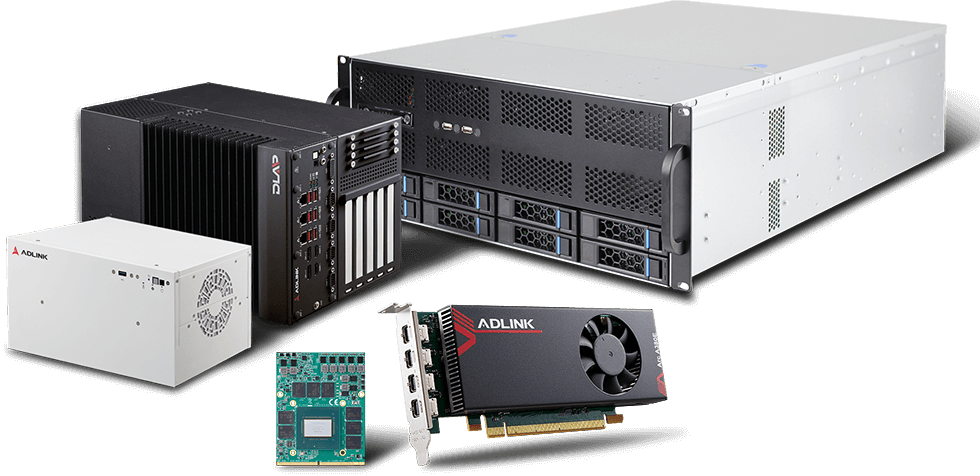Empowering Edge AI with
High-Performance GPU Solutions
ADLINK Advanced GPU Solutions

ADLINK is a global leader in advanced computing solutions, an Elite member of the NVIDIA Partner Network, and a Titanium Partner of Intel®. We empower edge systems with powerful GPU capabilities to drive AI and data-intensive tasks efficiently. From high-performance to low-power, ADLINK’s solutions meet diverse embedded requirements with reliability, extended lifecycle support, and adaptable form factors for a wide range of AI and edge computing applications.
Product Offering
Embedded MXM GPU Modules
PCI Express Graphics Cards & Portable GPU
NVIDIA Jetson-Based AI Vision Solutions
NVIDIA-Based GPU Components
Compatibility List
PCIe Graphics Card
| DLAP-8100 | AI workstation |
| DLAP-4000 | Edge AI Platform |
| DLAP-4100 | Edge AI Platform |
| IAP-M47-4U | IPC System |
| MLB-IGX | Medical Box PC |
| AmITX-AD-G | Motherboard |
| AmITX-CF-G | Motherboard |
| AmITX-RZ-G | Motherboard |
| AmITX-CF-I | Motherboard |
| AmITX-RL-I | Motherboard |
| AmITX-RL-WV | Motherboard |
| AXE-7400SR | AI Server |
| AXE-7220SPR | AI Server |
| MLB-IGX | Medical Box PC |
| AmITX-AD-G | Motherboard |
| AmITX-CF-G | Motherboard |
| AmITX-RZ-G | Motherboard |
| AmITX-CF-I | Motherboard |
| AmITX-RL-I | Motherboard |
| AmITX-RL-WV | Motherboard |
| MVP-6200 | Fanless PC |
| ADM-AL30 | Autonomous Driving Solutions |
| MLB-IGX | Medical Box PC |
| AmITX-AD-G | Motherboard |
| AmITX-CF-G | Motherboard |
| AmITX-RZ-G | Motherboard |
| AmITX-CF-I | Motherboard |
| AmITX-RL-I | Motherboard |
| AmITX-RL-WV | Motherboard |
| ADi-SA1X | Gaming Platform |
| ADi-SA2X | Gaming Platform |
| ADi-SA3X | Gaming Platform |
| ADi-SA6X | Gaming Platform |
| MVP-6200 | Fanless PC |
MXM GPU Module
| cPCI-A3MXM | MXM GPU Carrier Card |
| AVA-7200 | Fanless Scalable Railway Edge AI Platform |
| VPX3-MXM-RTX5000 | VPX GPGPU Card |
| MLB-3100/3102 | Medical Box PC |
| MLB-3000/3002 | Medical Box PC |
| DLAP-3000//3100/3200 | Edge AI Platform |
| DLAP-5200 | Fanless Edge AI Platform |
| cPCI-A3MXM/A1000 | MXM GPU Carrier Card |
| MLB-3100/3102 | Medical Box PC |
| MLB-3000/3002 | Medical Box PC |
| DLAP-3000//3100/3200 | Edge AI Platform |
Platform/ Device
| DLAP-401 | Edge AI Platform |
| RQX-58 | ROS 2 Robotic Controller |
| AVA-RAGX | Fanless AIoT Video Analytics Platform |
| DLAP-211-JNX | Edge AI Platform |
| NEON-2000-JNX | AI Smart Camera |
| DLAP-211-JT2 | Edge AI Platform |
| DLAP-211-Nano | Edge AI Platform |
| NEON-2000-JNO | AI Smart Camera |
| DLAP-411-Orin | Edge AI Platform |
| RQX-59/59G | ROS 2 Robotic Controller |
| DLAP-211-Orin NX | Edge AI Platform |
| DLAP-211-Orin Nano | Edge AI Platform |
| NEON-2000-ONO | AI Smart Camera |
Vertical Applications
GPUs can benefit edge applications by increasing application speed and accuracy, as well as decreasing latency. Many embedded system developers are using embedded graphics solutions in real-world applications, such as medical, manufacturing, and traffic management, as well as many other embedded segments.
Image Processing
Image Analysis
Computing Acceleration
Artificial intelligence
 Aerospace
Aerospace AI & Machine Learning
AI & Machine Learning Autonomous Vehicles
Autonomous Vehicles Smart Retail
Smart Retail Gaming
Gaming Healthcare
Healthcare Smart Manufacturing
Smart Manufacturing Transportation
Transportation











 NVIDIA-Based MXM
NVIDIA-Based MXM Intel-Based MXM
Intel-Based MXM NVIDIA PEG Card
NVIDIA PEG Card Intel PEG Card
Intel PEG Card Portable GPU
Portable GPU Medical Box PC
Medical Box PC Gaming Platform/ Motherboard
Gaming Platform/ Motherboard AI GPU Server
AI GPU Server Industrial PC
Industrial PC Edge AI Platform
Edge AI Platform Embedded Computer
Embedded Computer Railway Edge AI Platform
Railway Edge AI Platform Autonomous Vehicle
Autonomous Vehicle AI Smart Camera
AI Smart Camera AI Vision System
AI Vision System VPX GPGPU Card
VPX GPGPU Card MXM GPU Carrier Card
MXM GPU Carrier Card